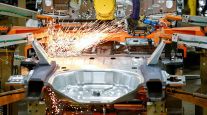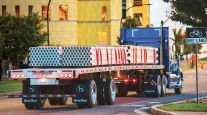Daimler China Deal Won’t Include High Tech
This story appears in the Dec. 5 print edition of Transport Topics.
TOKYO — Daimler AG will not have to give away advanced engine and vehicle technologies as part of its new joint venture with a Chinese truck maker because China’s emissions standards are behind Europe’s, and the market is not ready for the more advanced products, the head of Daimler Trucks said last week.
Daimler is in China to compete in a high-volume market, and the latest engine and emissions-controlling technologies are not needed, nor would customers accept them, said Andreas Renschler, who heads Daimler Trucks worldwide.
“We will develop trucks according to customer demands,” he said here Nov. 30 during a press event with executives from Mitsubishi Fuso Truck and Bus Corp., a Daimler subsidiary.
Daimler, the world’s largest commercial vehicle maker, completed an agreement Sept. 26, giving it a 50% stake in a new company, Beijing Foton Daimler. Foton Motor entered the truck business in 1998, according to a Daimler release announcing the joint venture, and is a major player in the Chinese domestic market.
Daimler’s strategy for the Chinese market will be to sell Mercedes-Benz trucks in select, smaller applications, such as emergency vehicles, and to use Foton’s new Auman model as a platform to achieve volume sales, Renschler said.
“You have to be in this [China] market with a strong friend,” he said. “If we are to compete in the volume segment, we must use an existing product and go with someone in the market.”
Foton sold about 105,000 units in 2010, according to a Daimler release.
Daimler will open an assembly plant in China to supply Mercedes engines for the Auman, and another production facility will open, giving the joint venture production capacity of about 160,000 units a year, he said.
In other comments, Renschler said that despite increasing uncertainties in world markets, “There is still some sunshine” and that Daimler will “see average growth worldwide because of the investment in our products. In the medium and long term, this is a growth business.”
Mitsubishi Fuso, whose supplier base was damaged severely as a result of the earthquake and subsequent tsunami that stuck Japan’s northern shore in March, is recovering its production capacity, and September sales of the company’s trucks in its home markets “almost tripled,” compared with March levels, he said.
“Truck demand in Japan will go up in the coming year because of replacement and construction efforts” to rebuild, he said.
Daimler’s growth strategy also includes other markets, such as India, Renschler said, noting that the new brand, BharatBenz, will begin selling trucks in India in 2012 and that Fuso will provide cabs, engines and transmissions for the models.
Truck production will start at a plant at Oragadam near Chennai, India, according to a Daimler release.




